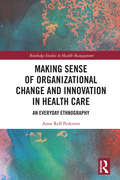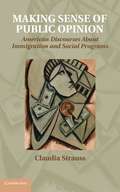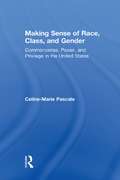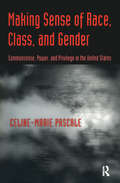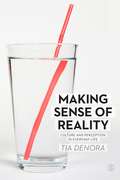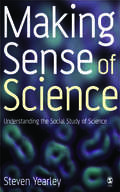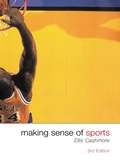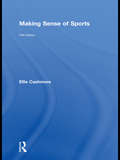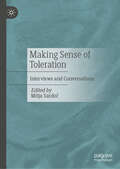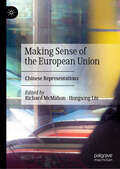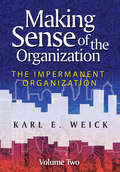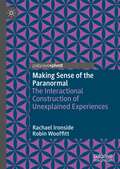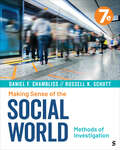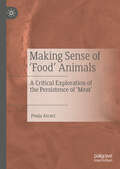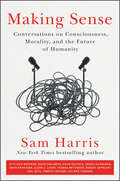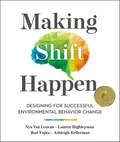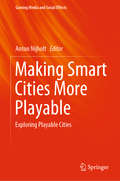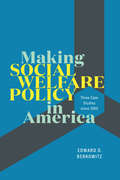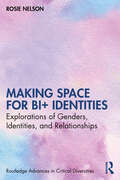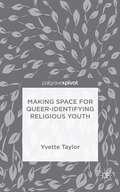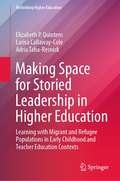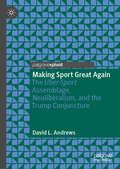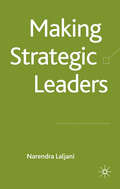- Table View
- List View
Making Sense of Organizational Change and Innovation in Health Care: An Everyday Ethnography (Routledge Studies in Health Management)
by Anne Reff PedersenThis book explores the hospital via organisational ethnography (OE), an approach that involves a mix of fieldwork methods designed to analyse the hospital which also includes participatory observation, qualitative interviews and shadowing. One way to define a hospital is by its high level of formal organisation, resulting in written or digital communication as the main source of communication in patient journals, minutes and medical and quality guidelines. In contrast, in this book, the aspects of the informal organisation will be the focus. In spite of the many formal regulations of healthcare, hospitals are also chaotic organising places where many different groups of people interact in order to negotiate, to practice and to make sense of daily work tasks. The underlying argument is that, in the mundane everyday life of hospitals, frontline workers and their interactions with patients and local managers remain at the core of organising hospitals. The overall purpose of this book is to report stories back from the field of healthcare, demonstrating how people, spaces and work (as examples of events) become important elements of organising hospitals. The book will be of interest to students and scholars in and across healthcare management, organisation studies, ethnography, sociology, qualitative methods, anthropology, service management and cultural studies.
Making Sense of Public Opinion
by Claudia StraussQuestions about immigration and social welfare programs raise the central issues of who belongs to a society and what its members deserve. Yet the opinions of the American public about these important issues seem contradictory and confused. Claudia Strauss explains why: public opinion on these issues and many others is formed not from liberal or conservative ideologies but from diverse vernacular discourses that may not fit standard ideologies but are easy to remember and repeat. Drawing on interviews with people from various backgrounds, Strauss identifies and describes 59 conventional discourses about immigration and social welfare and demonstrates how we acquire conventional discourses from our opinion communities. Making Sense of Public Opinion: American Discourses about Immigration and Social Programs explains what conventional discourses are, how to study them, and why they are fundamental elements of public opinion and political culture.
Making Sense of Race, Class, and Gender: Commonsense, Power, and Privilege in the United States
by Celine-Marie PascaleUsing arresting case studies of how ordinary people understand the concepts of race, class, and gender, Celine-Marie Pascale shows that the peculiarity of commonsense is that it imposes obviousness—that which we cannot fail to recognize. As a result, how we negotiate the challenges of inequality in the twenty-first century may depend less on what people consciously think about "difference" and more on what we inadvertently assume. Through an analysis of commonsense knowledge, Pascale expertly provides new insights into familiar topics. In addition, by analyzing local practices in the context of established cultural discourses, Pascale shows how the weight of history bears on the present moment, both enabling and constraining possibilities. Pascale tests the boundaries of sociological knowledge and offers new avenues for conceptualizing social change. In 2008, Making Sense of Race, Class and Gender was the recipient of the Distinguished Contribution to Scholarship Book Award, of the American Sociological Association Section on Race, Gender, and Class, for "distinguished and significant contribution to the development of the integrative field of race, gender, and class."
Making Sense of Race, Class, and Gender: Commonsense, Power, and Privilege in the United States
by Celine-Marie PascaleUsing arresting case studies of how ordinary people understand the concepts of race, class, and gender, Celine-Marie Pascale shows that the peculiarity of commonsense is that it imposes obviousness-that which we cannot fail to recognize. As a result, how we negotiate the challenges of inequality in the twenty-first century may depend less on what people consciously think about "difference" and more on what we inadvertently assume. Through an analysis of commonsense knowledge, Pascale expertly provides new insights into familiar topics. In addition, by analyzing local practices in the context of established cultural discourses, Pascale shows how the weight of history bears on the present moment, both enabling and constraining possibilities. Pascale tests the boundaries of sociological knowledge and offers new avenues for conceptualizing social change.
Making Sense of Reality: Culture and Perception in Everyday Life
by Tia DeNoraWhat is reality and how do we make sense of it in everyday life? Why do some realities seem more real than others, and what of seemingly contradictory and multiple realities? This book considers reality as we represent, perceive and experience it. It suggests that the realities we take as ‘real’ are the result of real-time, situated practices that draw on and draw together many things - technologies and objects, people, gestures, meanings and media. Examining these practices illuminates reality (or rather our sense of it) as always ‘virtually real’, that is simplified and artfully produced. This examination also shows us how the sense of reality that we make is nonetheless real in its consequences. Making Sense of Reality offers students and educators a guide to analysing social life. It develops a performance-based perspective (‘doing things with’) that highlights the ever-revised dimension of realities and links this perspective to a focus on object-relations and an ecological model of culture-in-action.
Making Sense of Reality: Culture and Perception in Everyday Life
by Tia DeNoraWhat is reality and how do we make sense of it in everyday life? Why do some realities seem more real than others, and what of seemingly contradictory and multiple realities? This book considers reality as we represent, perceive and experience it. It suggests that the realities we take as ‘real’ are the result of real-time, situated practices that draw on and draw together many things - technologies and objects, people, gestures, meanings and media. Examining these practices illuminates reality (or rather our sense of it) as always ‘virtually real’, that is simplified and artfully produced. This examination also shows us how the sense of reality that we make is nonetheless real in its consequences. Making Sense of Reality offers students and educators a guide to analysing social life. It develops a performance-based perspective (‘doing things with’) that highlights the ever-revised dimension of realities and links this perspective to a focus on object-relations and an ecological model of culture-in-action.
Making Sense of Science: Understanding the Social Study of Science
by Steven Yearley`Fluid, readable and accessible ... I found the overall quality of the book to be excellent. It provides an overview of major (and preceding) developments in the field of science studies. It examines landmark works, authors, concepts and approaches ... I will certainly use this book as one of the course texts' Eileen Crist, Associate Professor, Science & Technology in Society, Virginia Tech Science is at the heart of contemporary society and is therefore central to the social sciences. Yet science studies has often encountered resistance from social scientists. This book attempts to remedy this by giving the most extensive, thorough and best argued account of the field and explaining to social scientists why science matters to them. This is a landmark book that demystifies science studies and successfully bridges the divide between social theory and the sociology of science. Illustrated with relevant, illuminating examples, it provides the ideal guide to science studies and social theory.
Making Sense of Sports
by Ellis CashmoreSports are more important than ever socially, economically and culturally. As well as embodying cherished values and ideals, sports now reflect many of the worries of wider society. Drugs, racism, corruption and violence are all now major concerns and our experience of sport is increasingly subject to a gigantic industry made up of owners, players, sports goods manufacturers, television networks and corporate sponsors.In this newly expanded edition of Making Sense of Sports, Cashmore addresses all these issues as well as the more basic questions about the history of sports, its social context and possible future development. Among the new editions other themes are:* the body, how it works and why it is more cultural than natural* why women continue to be devalued and depreciated by sports* Nike, globalization and the sports industry* art and how it reflects changing conceptions of sports.
Making Sense of Sports
by Ellis CashmoreUpdated, revised and enhanced with new features, the fifth edition of Making Sense of Sports is the biggest and strongest yet. Ellis Cashmore's unique multidisciplinary approach to the study of sports remains the only introduction to combine anthropology, biology, economics, history, philosophy, psychology and sociology with cultural and media studies to produce a distinct unbroken vision of the origins, development and current state of sports. New chapters on exercise culture and the moral climate of sports support a thoroughly overhauled text that includes fresh material on Islam, sports commerce and corruption. Now packed with teaching supplements, including access to a dedicated online resource headquarters with video podcasts of twenty-one chapter outlines from the author (http://tinyurl.com/373oyvr), online quizzes, and an additional twenty-first chapter on depression and mental health in sports and exercise, the new edition contains a cornucopia of thought boxes, as well as guides to further reading, capsule explanations and model essays. In short, Making Sense of Sports is an all-purpose introduction to the study of sports.
Making Sense of Toleration: Interviews and Conversations
by Mitja SardočThis book brings together a collection of interviews and conversations with leading scholars across different disciplines and areas of research including moral and political philosophy, history, sociology, political theory, psychology, and jurisprudence, among others. It provides an authoritative presentation of contemporary accounts of toleration, their conceptual foundations, and a comprehensive presentation of the different concepts most commonly associated with it (e.g. civility, dignity, coercion, harm, conflict, disagreement, secularism, power, domination, trust, non-interference, neutrality, fairness, pluralism, respect, recognition and ultimately diversity itself). The interviews and conversations published in this volume address some of the most pressing controversies on toleration (and related issues) at both the theoretical and practical levels. Alongside customary refinements of arguments and positions usually embedded in academic conversations, these interviews provide unique insights into the ‘behind the scenes’ on one of the central topics in contemporary scholarly research.
Making Sense of the European Union: Chinese Representations
by Richard McMahon Hongsong LiuThis book explores how different Chinese social groups portray or discuss the European Union. The authors engage with issues such as trade, populism, EU crises, systemic rivalry and the Chinese media’s representation of European integration and Brexit. They use qualitative, quantitative and mixed-methods empirical research to show that, despite China’s authoritarian political system, social actors construct complex representations of the EU that may influence government policy. Rather than dismissing Chinese scholars as little more than state agents, one can benefit from their unique insights by analysing the prisms through which they view the world. In doing so, Western scholars can better understand the distinct institutional and cultural traditions that filter their own views of China.
Making Sense of the Organization
by Karl E. WeickMaking Sense of the Organization elaborates on the influential idea that organizations are interpretation systems that scan, interpret, and learn. These selected essays represent a new approach to the way managers learn and act in response to their environment and the way organizational change evolves. Readers of this volume will find a wealth of examples and insights which go well beyond thinking and cognition to explain action. The author's ideas are at the forefront of our thinking on leadership, teams, and the management of change."This book engages the puzzle of impermanence in organizing. Through rich examples, evocative language, artful literature citing, and imaginative connecting, Weick re-introduces core ideas and themes around attending, interpreting, acting and learning to unlock new insights about impermanent organizing. The wisdom in this book is timeless and timely. It prods scholars and managers of organizations to complicate their views of organizing in ways that enrich thought and action." - Jane E. Dutton, Robert L. Kahn Distinguished University Professor, University of Michigan
Making Sense of the Paranormal: The Interactional Construction of Unexplained Experiences
by Robin Wooffitt Rachael IronsideThis book is a study of how people collaboratively interpret events or experiences as having paranormal features, or as evidence of spiritual agency. The authors study recordings of paranormal research groups as they conduct real life investigations into allegedly haunted spaces and the analyses describe how, through their talk and embodied actions, participants collaboratively negotiate the paranormal status of the events they experience.By drawing on the study of the social organisation in everyday interaction, they show how paranormal interpretations may be proposed, contested and negotiated through conversational and embodied practices of the group. The book contributes to the sociology of anomalous experience, and explores its relevance to other social science topics such as dark tourism, participation in religious spaces and practices, and the attribution of agency. This book will therefore be of interest to academics and postgraduate researchers of language and social interaction; discourse and communication, cultural studies; social psychology, sociology of religious experience; parapsychology, communication and psychotherapy.
Making Sense of the Social World: Methods of Investigation
by Russell K. Schutt Daniel F. ChamblissThe bestselling Making Sense of the Social World: Methods of Investigation introduces social science research methods as a way to study diverse social processes and to improve our understanding of social issues. Each chapter illustrates principles and techniques in research methods through interesting examples drawn from social science investigations and everyday experiences. The many updates to the Seventh Edition include: new examples of contemporary research, including on social media and the impact of the COVID-19 pandemic; new developments in methods, including the challenges of the 2020 U.S. Census, survey response rates and survey question design, and more emphasis on culturally responsive research ethics; a new "Research in the News" feature in every chapter gives topical examples of social research from the news media; and new statistical data incorporated throughout, including from the 2022 General Social Survey.
Making Sense of the Social World: Methods of Investigation
by Russell K. Schutt Daniel F. ChamblissThe bestselling Making Sense of the Social World: Methods of Investigation introduces social science research methods as a way to study diverse social processes and to improve our understanding of social issues. Each chapter illustrates principles and techniques in research methods through interesting examples drawn from social science investigations and everyday experiences. The many updates to the Seventh Edition include: new examples of contemporary research, including on social media and the impact of the COVID-19 pandemic; new developments in methods, including the challenges of the 2020 U.S. Census, survey response rates and survey question design, and more emphasis on culturally responsive research ethics; a new "Research in the News" feature in every chapter gives topical examples of social research from the news media; and new statistical data incorporated throughout, including from the 2022 General Social Survey.
Making Sense of ‘Food’ Animals: A Critical Exploration of the Persistence of ‘Meat’
by Paula ArcariThis book addresses the persistence of meat consumption and the use of animals as food in spite of significant challenges to their environmental and ethical legitimacy. Drawing on Foucault’s regime of power/knowledge/pleasure, and theorizations of the gaze, it identifies what contributes to the persistent edibility of ‘food’ animals even, and particularly, as this edibility is increasingly critiqued. Beginning with the question of how animals, and their bodies, are variously mapped by humans according to their use value, it gradually unpacks the roots of our domination of ‘food’ animals – a domination distinguished by the literal embodiment of the ‘other’. The logics of this embodied domination are approached in three inter-related parts that explore, respectively, how knowledge, sensory and emotional associations, and visibility work together to render animal’s bodies as edible flesh. The book concludes by exploring how to more effectively challenge the ‘entitled gaze’ that maintains ‘food’ animals as persistently edible.
Making Sense: Conversations on Consciousness, Morality, and the Future of Humanity
by Sam HarrisFrom the bestselling author of Waking Up and The End of Faith, an adaptation of his wildly popular, often controversial podcast“Civilization rests on a series of successful conversations.” —Sam Harris Sam Harris—neuroscientist, philosopher, and bestselling author—has been exploring some of the most important questions about the human mind, society, and current events on his podcast, Making Sense. With over one million downloads per episode, these discussions have clearly hit a nerve, frequently walking a tightrope where either host or guest—and sometimes both—lose their footing, but always in search of a greater understanding of the world in which we live. For Harris, honest conversation, no matter how difficult or controversial, represents the only path to moral and intellectual progress. This book includes a dozen of the best conversations from Making Sense, including talks with Daniel Kahneman, Timothy Snyder, Nick Bostrom, and Glen Loury, on topics that range from the nature of consciousness and free will, to politics and extremism, to living ethically. Together they shine a light on what it means to “make sense” in the modern world.
Making Shift Happen: Designing for Successful Environmental Behavior Change
by Nya Van Leuvan Lauren Highleyman Rod Fujita Ashleigh KellermanNautilus Book Award Winner: An “engagingly written” behavioral science-based guide to tackling our urgent environmental problems (Robert B. Cialdini, author of Influence: The Psychology of Persuasion).To create a sustainable future and achieve positive, durable change, we must design solutions based directly on how people think, make decisions, and act. From hotels that save water (and money) using simple signage to energy suppliers that boost participation in renewable energy programs through mere enrollment-form tweaks, it’s clear that shifting the behavior of millions for the better is possible.Based on decades of research into what drives behavior change, Making Shift Happen provides a suite of powerful tools to transform the world. It features A-to-Z guidance on how to design a behavior change initiative—from choosing the right audience and uncovering what drives their behavior to designing, prototyping, testing, and implementation. Clear instructions and real-world examples empower you to apply hundreds of behavioral science solutions including:Using social norms to spread positive environmental behaviorsSelecting and testing stories, metaphors, and values to frame information for each audienceCatalyzing action by aligning your initiative with your audience’s personal and social motivatorsBreaking bad habits and building positive onesCapturing your audience’s attention and reducing barriers to actionConnecting people with nature and building empathy for the environment and its inhabitantsMaking Shift Happen is a must-have guide for practitioners in non-profits, governments, and businesses looking to design successful campaigns and initiatives that shift behaviors and mindsets toward positive environmental outcomes and a better future for all.“Completely fascinating—we’ve learned a lot about the ways minds work in the last decades and that may help us figure out how to appeal to our better angels more effectively than in the past. Rest assured that people who want to sell us junk are paying attention to these insights—the rest of us better do so too!” —Bill McKibben, author of The End of Nature
Making Smart Cities More Playable: Exploring Playable Cities (Gaming Media and Social Effects)
by Anton NijholtThis book explores the ways in which the broad range of technologies that make up the smart city infrastructure can be harnessed to incorporate more playfulness into the day-to-day activities that take place within smart cities, making them not only more efficient but also more enjoyable for the people who live and work within their confines. The book addresses various topics that will be of interest to playable cities stakeholders, including the human–computer interaction and game designer communities, computer scientists researching sensor and actuator technology in public spaces, urban designers, and (hopefully) urban policymakers. This is a follow-up to another book on Playable Cities edited by Anton Nijholt and published in 2017 in the same book series, Gaming Media and Social Effects.
Making Social Welfare Policy in America: Three Case Studies since 1950
by Edward D. BerkowitzAmerican social welfare policy has produced a health system with skyrocketing costs, a disability insurance program that consigns many otherwise productive people to lives of inactivity, and a welfare program that attracts wide criticism. Making Social Welfare Policy in America explains how this happened by examining the historical development of three key programs—Social Security Disability Insurance, Medicare, and Temporary Aid to Needy Families. Edward D. Berkowitz traces the developments that led to each program’s creation. Policy makers often find it difficult to dislodge a program’s administrative structure, even as political, economic, and cultural circumstances change. Faced with this situation, they therefore solve contemporary problems with outdated programs and must improvise politically acceptable solutions. The results vary according to the political popularity of the program and the changes in the conventional wisdom. Some programs, such as Social Security Disability Insurance, remain in place over time. Policy makers have added new parts to Medicare to reflect modern developments. Congress has abolished Aid to Families of Dependent Children and replaced with a new program intended to encourage work among adult welfare recipients raising young children. Written in an accessible style and using a minimum of academic jargon, this book illuminates how three of our most important social welfare programs have come into existence and how they have fared over time.
Making Space for Bi+ Identities: Explorations of Genders, Identities, and Relationships (Routledge Advances in Critical Diversities)
by Rosie NelsonHow do bi+ people navigate identity, gender, and relationships in a biphobic society? This book explores this question to show how to better include and incorporate bi+ people in research, policy, and the everyday. You can expect this book to explore how bi+ people experience the gender binary, healthcare, sex, flirting, media representation, and research. It soon becomes clear that bi+ people have different needs and experiences than heterosexual, lesbian, and gay people, and so need specific inclusion measures. Further, the research explores bi+ people’s nuanced approaches to understanding gender, sexuality, sex, and flirting. This book will be of interest to anyone, whether bi+, a student, a researcher, a policymaker, or a health worker, looking to develop their understanding of bi+ identities and needs. It will also be relevant to people interested in a broad range of topics, including sexuality, gender, feminism, trans and non binary identities, LGBTQ+ topics, and everyday sociology.
Making Space for Queer-Identifying Religious Youth
by Yvette TaylorMaking Space for Queer-Identifying Religious Youth charts young people's understanding of religion, investigating the experiences, choices and identities of queer - lesbian, gay, bisexual, transgender - youth involved in inclusive churches. Rather than assume that sexuality and religion, and in this case Christianity, are separate and divergent paths, this book explores how they might mutually and complexly construct one another in times of religious-sexual citizenship. Taylor presents a methodological discussion on the 'public sociology' of religion and sexuality studies, and provides an illustrative focus on substantive fields often separated in disciplinary dis-orientations. These examples illustrate how participation shapes identifications; how marginalization and discrimination are managed; and how religion and sexuality serve as vehicles for various forms of belonging, identification and expression. 'Religion' and 'sexuality' are mutually constructed through gendered spaces, online spaces, and sensory spaces.
Making Space for Storied Leadership in Higher Education: Learning with Migrant and Refugee Populations in Early Childhood and Teacher Education Contexts (Rethinking Higher Education)
by Elizabeth P. Quintero Larisa Callaway-Cole Adria Taha-ResnickThis book analyzes stories of university early childhood faculty members, community activists in southern California, and children and the early childhood teacher education students working with them. The grounding of this research is reconceptualization of postmodern narrative theoretical influences. Through narrative inquiry, the book connects ongoing research to ongoing pedagogy. It explores the following research questions: (1) How do learners across generations create, build upon, and reinvent each other’s stories to make new meanings through consideration of family history, multigenerational knowledge, and experiences?; (2) How do learners’ stories offer new possibilities through leadership that connects Global South knowledge with Global North contexts?; (3) In what ways is it possible to use this framework and methodology in Higher Education to promote systemic consistency in promoting social justice that is generatively inclusive?More than half of the research participants have truly lived bi-culturally, many of the children in the early care and education programs in the USA are from Mexico and Central America. These collaborators truly carry their roots with them as they strive for justice and authenticity in early childhood teacher education and community activists working with families and children.
Making Sport Great Again: The Uber-Sport Assemblage, Neoliberalism, and the Trump Conjuncture
by David L. AndrewsBlending critical theory, conjunctural cultural studies, and assemblage theory, Making Sport Great Again introduces and develops the concept of uber-sport: the sporting expression of late capitalism’s conjoined corporatizing, commercializing, spectacularizing, and celebritizing forces. On different scales and in varying spaces, the uber-sport assemblage is revealed both to surreptitiously reinscribe the neoliberal preoccupation with consumption and to nurture the individualized consumer subject. Andrews further probes how uber-sport normalizes the ideological orientations and associate affective investments of the Trump assemblage’s authoritarian populism. Even as it articulates the regressive politicization of sport, Making Sport Great Again serves also as a call to action: how might progressives rearticulate uber-sport in emancipatory and actualizing political formations?
Making Strategic Leaders
by Narendra LaljaniMotivated by a desire to improve the effectiveness of the development of strategic leaders, this book focuses on the individual charged with shaping strategy and leading change in organizations. It offers a new and insightful model of strategic leader capability, and challenges much of the received wisdom of the leader development industry.
